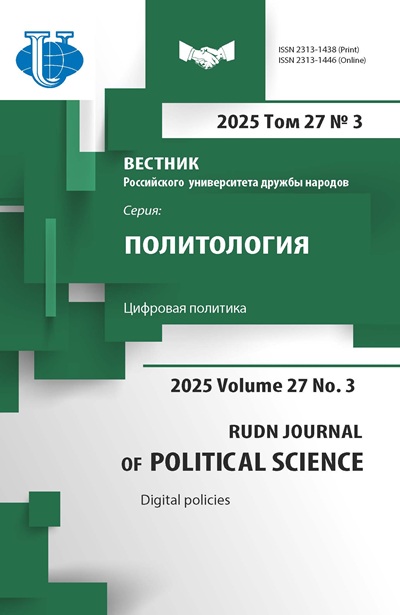Digital Image and Socio-Political Activities of the Russian Governors in the Context of a Special Military Operation
- Autores: Gnedash A.A.1, Birucheva E.I.1
-
Afiliações:
- Kuban State University
- Edição: Volume 27, Nº 3 (2025): Digital policies
- Páginas: 654-672
- Seção: DIGITAL TRANSFORMATION
- URL: https://journal-vniispk.ru/2313-1438/article/view/348842
- DOI: https://doi.org/10.22363/2313-1438-2025-27-3-654-672
- EDN: https://elibrary.ru/JIGVMA
- ID: 348842
Citar
Texto integral
Resumo
In the context of active digitalization and mediatization of the social and political life of society, digital communications between citizens and government representatives, primarily using social media, are becoming increasingly important. The digital image, as well as its positioning, are becoming not a secondary activity of a political actor, but the main one, since the information they broadcast, including socio-political information, directly affects citizens’ perception of the reality. Today, the online space is becoming the primary platform for the functioning, positioning and assessment of the perception of political actors by citizens - online users, since the Internet space is recognized as a social institution endowed with all institutional features and meanings. The purpose of this article is to study the image and socio-political activities of Russian governors who are forced to act in new crisis realities; to study the processes of transformation of the digital image of these heads of regions; in assessing the effectiveness of information coverage of the socio-political activities of governors in the digital space in the conditions of their own. The study was conducted using the following methods: content analysis, visual analysis and linguodiscursive analysis. The empirical base is the open data of eight telegram channels belonging to Russian governors in the period 2023: “Nastoyashchij Gladkov”, “AV BogomaZ”, “Gusev”, “Veniamin Kondratiev”, “Roman Starovoit (emoji of the flag of the Russian Federation)”, “Aksenov Z 82”, “Vasily Golubev”, “Razvozhaev”, including a corpus of texts, video and photographic materials, as well as all comments and “reactions” contained in these accounts for the period June 2023. The main results of the study are to describe the digital image system of governors facing crisis situations, to identify areas of socio-political activity that they continue to develop, despite the prevailing conditions. The described research methodology made it possible to identify how the governors of Russian regions in non-standard geopolitical conditions construct their digital image, which socio-political topics they raise, how they interact with citizens and design information coverage of their activities in social media.
Sobre autores
Anna Gnedash
Kuban State University
Autor responsável pela correspondência
Email: anna_gnedash@inbox.ru
ORCID ID: 0000-0002-3516-107X
PhD of Political Science, Associate Professor of the Department of State Policy and Public Administration
Krasnodar, Russian FederationEkaterina Birucheva
Kuban State University
Email: biriu4yova.ek@yandex.ru
ORCID ID: 0009-0002-4094-3989
Lecturer of the Department of Political Science and Political Management, External PhD student at the Department of Public Policy and Public Administration
Krasnodar, Russian FederationBibliografia
- Castells, M. (2004). Galaxy Internet: reflections on the Internet, business and society. A. Matveyev (Transl.), V. Kharitonov (Ed.). Ekaterinburg: U-Factory, 328 p. (In Russian).
- Habermas, J. (1989). The Structural Transformation of the Public Sphere: An Inquiry into a Category of Bourgeois Society. Cambridge. 301 p.
- Kоzakov, V. Kovalenko, N., Golub, V., Kozyrieva, N., Shchur, N., & Shoiko, V. (2021). Adaptation of the Public Administration System to Global Risks. Journal of Management Information and Decision Sciences, 24(2), 1–8.
- Markov, A.A., Markov, A.A., & Krasnova, G.V. (2023). Criteria for social stabilization during crisis and emergency periods. Izvestiya SPbGEU, (3), 137–143. (In Russian).
- Merzlikin, N.V., & Ivanov, A.V. (2022). Social consolidation in the context of a special military operation (expert assessment). Science. Culture. Society, 28(4), 85–96. (In Russian). https://doi.org/10.19181/nko.2022.28.4.7
- Salomonsen, H.H., & Hart, P. (2020). Communicating and Managing Crisis in The World of Politics. In: F. Frandsen, W. Johansen (Eds.), Crisis Communication (Handbooks of Communication Science, (vol. 23.)1 ed. Berlin: Mouton de Gruyter.
- Shushpanova, I.S. (2022). Features of the socio-political consolidation of Russian society and the state in the conditions of a special military operation: sociological analysis. Science. Culture. Society, 28(4), 97–108. (In Russian). https://doi.org/10.19181/nko.2022.28.4.8
- Ulmer, R., Sellnow, T., & Seeger, M. (2006). Effective crisis communication: moving from crisis to opportunity. Thousand Oaks, CA: Sage.
- Velikaya, N.M., & Zaitseva, A.A. (2023). Representation of a special military operation in print media in the context of consolidation of Russian society. Caucasian Science Bridge, 5(4), 160–172. (In Russian). https://doi.org/10.18522/2658-5820.2022.4.16
Arquivos suplementares








